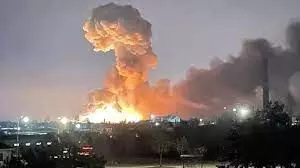Ukraine, Russia attend UN General Assembly ahead war anniversary

A special session of the UN General Assembly on Thursday is expected to overwhelmingly adopt a resolution on peace between Russia and Ukraine.
The Assembly on Wednesday revealed the wide rift between both parties to the war one year after Russia launched its full-scale invasion of Ukraine.
While Ukrainian Foreign Minister Dmytro Kuleba accused the Russian side of committing genocide, Russia’s ambassador to the United Nations Vasily Nebenzya told the high-profile meeting that the West was planning to “dismember and destroy” his country.
On the first day of the two-day session, on occasion of the anniversary of the Russian invasion on Friday, Kuleba presented a resolution at the UN General Assembly calling for peace and Moscow’s withdrawal.
Dozens of speeches by high-ranking officials are expected before then, including U.S. Secretary of State Antony Blinken, British Foreign Secretary James Cleverly and German Foreign Minister Annalena Baerbock.
The strategy of Ukraine’s Western backers is not to put complex outlines for ending the war to a vote, but to get as many countries as possible to vote “yes” to the general motion in support of peace.
In doing so, they want to build on last October’s results, when 143 countries opposed Moscow’s annexations in Ukraine and said they violated international law.
A strong result would counter accusations that there is war fatigue and crumbling support for Kiev in some parts of the world, especially those reliant of Russian fuel.
On Wednesday, Kuleba accused Moscow of committing “genocide” in light of accusations that Ukrainian children have been forcibly deported to Russia.
He said Moscow was resettling thousands of children with Russian families in order for them to be re-educated as Russians.
“This is a genocide. And this is what we face today,” Kuleba said.
Moscow claims the transfer of Ukrainians to Russia is as an escape from the combat zone. The Russian side also denies the abduction of children despite evidence to the contrary.
Russia’s ambassador to the United Nations, meanwhile, accused Germany and the West of having motives in the Ukraine conflict similar to those in World War II.
“This is a war in which, as it was also the case 80 years ago, involves treacherous and powerful enemies who want to take over our land and subjugate us,” Nebenzya told the UN General Assembly.
“German tanks will once again kill Russians,” he said, referring to the German-made Leopard battle tanks several European countries have promised to send Kiev.
After nearly 12 months of war, UN Secretary General António Guterres’ outlook was largely pessimistic as he warned of a widening conflict and the use of nuclear weapons.
“Over the past year, not only have we seen suffering and devastation grow, it is also becoming more evident just how much worse it could all still become.
The possible consequences of a spiralling conflict are a clear and present danger,” he said.
“Meanwhile, we have heard implicit threats to use nuclear weapons. The so-called tactical use of nuclear weapons is utterly unacceptable. It is high time to step back from the brink.”
Russian President Vladimir Putin ratcheted up nuclear worries on Tuesday when he announced Russia would step back from the last remaining nuclear arms control treaty with the U.S.
Linda Thomas-Greenfield, the U.S. ambassador to the United Nations, meanwhile called for the adoption of the resolution proposed by Ukraine.
“We have before us a resolution that calls on the nations of the world to support diplomatic efforts to achieve a comprehensive and lasting peace in Ukraine,” she said.
Over the past months, it had been widely discussed how far a UN resolution on occasion of the anniversary of the war in Ukraine should go.
Kiev had been working on resolutions outlining a war crimes tribunal as well as a text that would turn a 10-step peace plan by Ukrainian President Volodymyr Zelensky into a UN document, according to UN sources.
Both ideas have been abandoned for the vote, which is expected on Thursday afternoon.
The current proposal mostly includes vague formulations regarding an end to the war, calling for peace and Moscow’s withdrawal.
It also calls for an exchange of all prisoners of war between Ukraine and Russia and stresses the need for those responsible for the most serious war crimes to be held to account.
Diplomats estimate the resolution could be adopted with the votes of between 130 to 140 countries.



